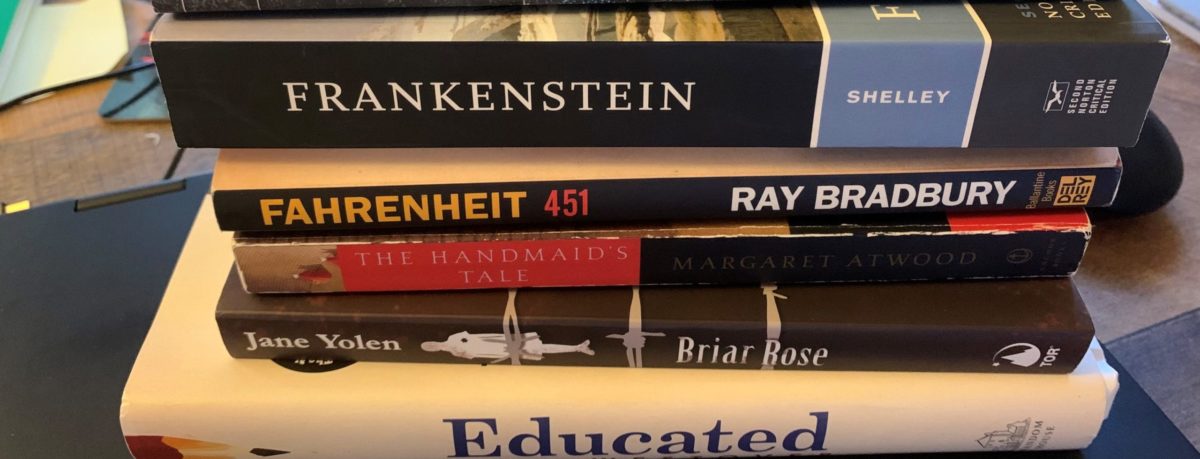Finding Joy in My Book Stack Again

Among some English teachers, we love to talk about our “stack,” the pile of books that we teach in a given semester. The National Council of Teachers of English actually has an initiative called “Build Your Stack,” with the express purpose of encouraging teachers to build their knowledge of diverse books and their own classroom libraries.
A few weeks ago, one of my colleagues in the ELA Department posted an image to our Teams channel of her stack with the question, “What’s everybody reading this semester?” Looking at her stack, I saw a number of favorites; Paolo Coelho’s The Alchemist, Sylvia Plath’s The Bell Jar, Suzanne Collins’s The Hunger Games, and Octavia Butler’s Kindred all made me excited (and a little jealous). Her semester looked like a fantastic one full of compelling and gripping literature.
I posted my reply, “My stack is not quite ready for display yet; some of my students are still deciding.” It’s that second clause that means the world to me, in terms of teaching at Fusion Global.
My students are still deciding.
Stacks of Years Past vs. Now
At all of the other schools I have taught at for the twenty years preceding my move to FGA, a curriculum was handed to me by a state, a district, or a department chair. The books that comprise the course were selected by others for all of the students in my classes, whether they had twelve students or twenty-five. I would have to spend time cajoling, persuading, and sometimes pleading for students to work through a book they didn’t like, promising, “Well, the next one might be different.” Given enough time, I might be able to work a new book into the curriculum that would hopefully excite those readers who had not been engaged yet.
At Fusion, I get to know my students in their individual classroom first. Knowing the standards and expectations of the curriculum, I compile a list of possibilities that will entice and hopefully engage the students. We come to that selection together, and then together, we read and learn.
Student Agency, Empowerment, and Engagement
This brings me back to my stack this semester, and it is wild with potential. A student who loves fairy tales and historical fiction around the Holocaust is exploring Jane Yolen’s Briar Rose. Mad scientists seem to be taking over with two students picking Mary Shelley’s Frankenstein and another picking H.G. Wells’s The Island of Doctor Moreau. Dystopian literature is also happening this semester with both Ray Bradbury’s Fahrenheit 451 and Margaret Atwood’s The Handmaid’s Tale looming ominously in classes. There are even a pair of twenty-first-century texts (which were rarer than a rainbow-colored unicorn in my old classroom) that students chose, N.K. Jemisin’s award-winning science-fiction, The Fifth Season, and Tara Westover’s memoir, Educated. The student who selected Educated had actually suggested it to me first. I had never read it, and now we are reading the text together. Rather than walking a familiar path for me, we are exploring and analyzing new terrain together.
As a teacher, the freedom to teach the student a text that excites and interests them, elevates my craft. Empowering students with agency to determine a bit of their own academic journey challenges me in new ways which is what satisfies me as a teacher. After twenty years, I left the physical classroom looking for something different. I dipped my toe into online teaching with a university course and picked up a class at the community college. Neither was really making me happy, but they were something new. Then the pandemic hit, and I thought I would never teach again. A year ago, my kids were settling into their physical classrooms, and I thought, maybe it’s time to give FGA a try.
By the end of that first school year, I had spent hours with my students, building a totally different stack. Fences, The Great Gatsby, Animal Farm, Seedfolks, Fallen Angels, and The Laramie Project were just a few of the texts. Thrilled with what I had found at FGA, I spent the summer redesigning my office space and upgrading the desk, camera, and monitor, because teaching had moved from being a hobby back to a profession.
I have no idea what next semester will hold, what my students will bring to the classes, what texts we will explore together. But I do know that I cannot wait to build that new stack and rebuild it again and again.

